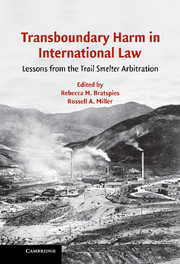Book contents
- Frontmatter
- Contents
- Contributors
- Acknowledgments
- Foreword by David D. Caron
- TRANSBOUNDARY HARM IN INTERNATIONAL LAW
- Introduction
- PART ONE THE TRAIL SMELTER ARBITRATION – HISTORY, LEGACY, AND REVIVAL
- 1 “An Outcrop of Hell”: History, Environment, and the Politics of the Trail Smelter Dispute
- 2 The Trail Smelter Dispute [Abridged]
- 3 Of Paradoxes, Precedents, and Progeny: The Trail Smelter Arbitration 65 Years Later
- 4 Pollution by Analogy: The Trial Smelter Arbitration [Abridged]
- 5 Has International Law Outgrown Trail Smelter?
- 6 The Flawed Trail Smelter Procedure: The Wrong Tribunal, the Wrong Parties, and the Wrong Law
- 7 Rereading Trail Smelter [Abridged]
- 8 Trail Smelter and the International Law Commission's Work on State Responsibility for Internationally Wrongful Acts and State Liability
- 9 Derivative versus Direct Liability as a Basis for State Liability for Transboundary Harms
- 10 Transboundary Pollution, Unilateralism, and the Limits of Extraterritorial Jurisdiction: The Second Trail Smelter Dispute
- PART TWO TRAIL SMELTER AND CONTEMPORARY TRANSBOUNDARY HARM – THE ENVIRONMENT
- PART THREE TRAIL SMELTER AND CONTEMPORARY TRANSBOUNDARY HARM – BEYOND THE ENVIRONMENT
- Annex A Convention Between the United States of America and the Dominion of Canada Relative to the Establishment of a Tribunal to Decide Questions of Indemnity and Future Regime Arising from the Operation of Smelter at Trail, British Columbia
- Annex B Trail Smelter Arbitral Tribunal Decision, April 16, 1938
- Annex C Trail Smelter Arbitral Tribunal March 11, 1941, Decision
- Index
3 - Of Paradoxes, Precedents, and Progeny: The Trail Smelter Arbitration 65 Years Later
Published online by Cambridge University Press: 08 September 2009
- Frontmatter
- Contents
- Contributors
- Acknowledgments
- Foreword by David D. Caron
- TRANSBOUNDARY HARM IN INTERNATIONAL LAW
- Introduction
- PART ONE THE TRAIL SMELTER ARBITRATION – HISTORY, LEGACY, AND REVIVAL
- 1 “An Outcrop of Hell”: History, Environment, and the Politics of the Trail Smelter Dispute
- 2 The Trail Smelter Dispute [Abridged]
- 3 Of Paradoxes, Precedents, and Progeny: The Trail Smelter Arbitration 65 Years Later
- 4 Pollution by Analogy: The Trial Smelter Arbitration [Abridged]
- 5 Has International Law Outgrown Trail Smelter?
- 6 The Flawed Trail Smelter Procedure: The Wrong Tribunal, the Wrong Parties, and the Wrong Law
- 7 Rereading Trail Smelter [Abridged]
- 8 Trail Smelter and the International Law Commission's Work on State Responsibility for Internationally Wrongful Acts and State Liability
- 9 Derivative versus Direct Liability as a Basis for State Liability for Transboundary Harms
- 10 Transboundary Pollution, Unilateralism, and the Limits of Extraterritorial Jurisdiction: The Second Trail Smelter Dispute
- PART TWO TRAIL SMELTER AND CONTEMPORARY TRANSBOUNDARY HARM – THE ENVIRONMENT
- PART THREE TRAIL SMELTER AND CONTEMPORARY TRANSBOUNDARY HARM – BEYOND THE ENVIRONMENT
- Annex A Convention Between the United States of America and the Dominion of Canada Relative to the Establishment of a Tribunal to Decide Questions of Indemnity and Future Regime Arising from the Operation of Smelter at Trail, British Columbia
- Annex B Trail Smelter Arbitral Tribunal Decision, April 16, 1938
- Annex C Trail Smelter Arbitral Tribunal March 11, 1941, Decision
- Index
Summary
PARADOXES
A fountainhead of transboundary pollution becomes the fountainhead of law prohibiting transboundary pollution.
An industrial activity that is synonymous with environmental threats becomes synonymous with environmental protection.
A small town in Canada becomes known throughout the world for an international arbitration that bears its name.
For the fact that there was an international arbitration at all we owe thanks to an antique English rule of civil procedure. And,
The country that “won” the arbitration has more recently been equivocal as to the legal status of the fundamental principle on which the award was based.
On March 11, 1941, just over 65 years ago, the Trail Smelter Tribunal, composed of jurists from Canada, the United States and Belgium, delivered an award that ushered in a new era in a field that has become known as international environmental law. The Tribunal held, in essence, that Canada was required to see to it that the smelter at Trail, British Columbia, would “refrain from causing any damage through fumes [to agricultural interests] in the State of Washington;…”
I first began studying the Trail Smelter arbitration in the early 1970s, which is roughly equidistant in time from both the Tribunal's final award and the publication of this volume. I wondered why this controversy, essentially between a private smelter on one side of the U.S.-Canadian border and private landowners on the other, could not simply have been resolved through national courts.
- Type
- Chapter
- Information
- Transboundary Harm in International LawLessons from the Trail Smelter Arbitration, pp. 34 - 45Publisher: Cambridge University PressPrint publication year: 2006
- 2
- Cited by



